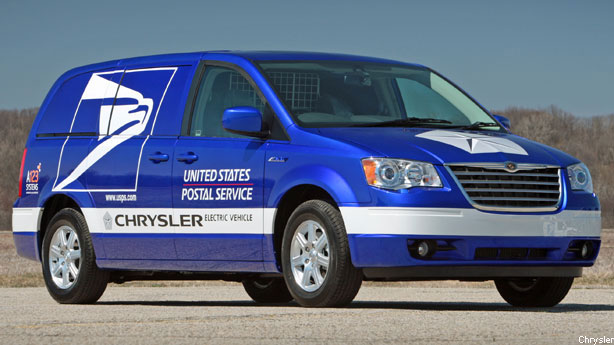
It debuted just over a year ago at the 2009 Detroit Auto Show, but any hopes that Chrysler might build this plug-in hybrid minivan were dashed. Months after its debut, Chrysler declared bankruptcy and then its new corporate overlords at Fiat scuttled the program that had been tasked with developing such electric-drive vehicles.
The Town & Country EV was said to be a standard Chrysler minivan powered by a 200 kW electric motor and a lithium ion battery pack. Much like the forthcoming Chevy Volt, a small-displacement gasoline engine would act as a generator, allowing the vehicle to travel farther than the 40-mile range of its batteries. Chrysler was rather slight on the details, leading to speculation that this was a concept developed more by the PR department than anyone in engineering. But four months later, the company did show off similar, all-electric minivan concepts designed for the US Postal Service.
Electric minivans are actually old-hat for Chrysler, which built its first in 1993. Based on the second-generation Dodge Caravan and dubbed "TEVan," these were sold only to fleet customers, primarily electric utilities. Roughly 56 were produced, travelling along the same assembly line in Windsor, Ontario, as the standard models. A few have since passed into private ownership.
The vehicles were powered by a 54 kW electric motor mated to a two-speed transmission, which afforded a top speed of 65 mph. Range was estimated at about 80 miles from a 180-volt battery pack that used either nickel-cadmium or nickel-iron batteries. The vans had a recharger built in, which plugged into a standard 220v outlet, and they were fully certified to meet California's Zero Emission Vehicle Standard.
Chrysler built another electric minivan starting in 1997, the EPIC, for "Electric Power Inter-urban Commuter." Leased to fleets only, it was based on a 1992 concept, using a 324-volt lead-acid battery pack (later models used nickel-metal hydride batteries) and an improved motor.
Alas, by the turn of the century, Chrysler had pretty much given up on electric vehicles -- just like most every other carmaker. Daimler-Benz had bought the company in 1998, and the prevailing attitude of its German parent was that battery-powered electrics were not feasible. The new DaimlerChrysler shifted most of its focus to developing hydrogen fuel cell powered vehicles, and the electric minivan was no more.


Sign in to post
Please sign in to leave a comment.
Continue